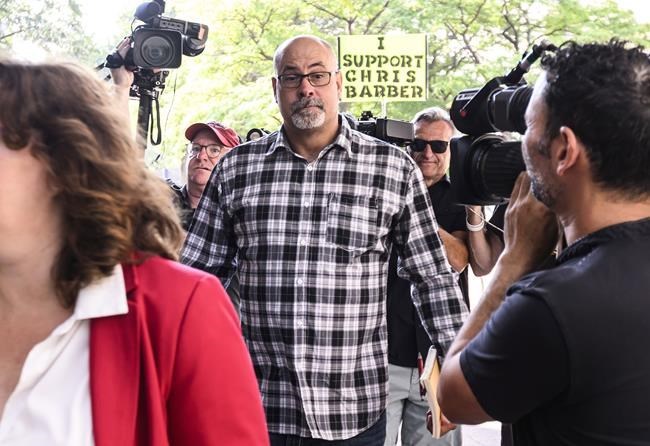OTTAWA — Hope that the trial of two "Freedom Convoy" organizers would last only four weeks may be dashed after the defence raised complaints about receiving heaps of new evidence three days after the trial began.
Justice Heather Perkins-McVey told the court there is a potential risk for the trial to go "off the rails," if it continues to evolve in the way it has been going. She used the day of court time on Friday to try to "crystallize the evidence" for the remainder of the trial.
Before that, there was a sense of tension in the courtroom as Crown and defence lawyers sparred over the timing of the delivery of binders full of text messages.
The justice called a short recess to step away from the bench to "settle" herself after telling the lawyers she was "very unhappy" about the late-stage disclosure.
"This should have been done well before the trial," she chided before leaving the courtroom.
Perkins-McVey is now working with court staff to find more dates as the prospect the trial will run long has grown. Initially 16 days were set aside for the trial, with three extra days added to the court's calendar as a precaution.
But as the first week of hearings drew to a close Friday, it was clear the timelines were on the brink of being blown.
The text messages are from the cellphone belonging to Chris Barber, who is co-accused with Tamara Lich of mischief, counselling others to commit mischief and obstructing police.
The charges relate to the role the two played in organizing the convoy that blocked streets in downtown Ottawa for three weeks in the winter of 2022.
Social media and other digital communications are key to the Crown's case, which alleges Barber and Lich exerted control and influence over the unlawful protest, and that they counselled demonstrators to remain in Ottawa after police ordered them out.
Barber's lawyer Diane Magas said she asked the Crown to whittle down tens of thousands of her client's text messages to just the ones expected to be entered into evidence.
Crown lawyer Tim Radcliffe said that request came just before the trial started and was fulfilled this week.
Magas said based on what the Crown had told her she expected roughly 22 of Barber's chats to be at issue. Instead, she said she was given 135 chats to wade through on Thursday.
She told the judge she didn't know how she could be expected to digest the evidence and make sure her client has a fair trial.
The chats are also relevant to Lich's case because the Crown hopes to prove that the two organizers conspired so closely together that evidence against one should apply to both of them.
The tempers of lawyers on both sides of the courtroom flared during the debate over the texts.
Similar conflicts have played out over the disclosure and admissibility of video and social media evidence in the first week of the trial. Though four police officers have taken the stand so far, only one has finished testifying.
For the others, their evidence has been interrupted by complaints by the defence lawyers that they don't have all the information they need to craft their defence, or about the admissibility of the evidence.
On Friday afternoon, the lawyers also argued about whether the "Freedom Convoy 2022" Facebook page should be admitted.
The Crown says the page is evidence that helps prove Lich and Barber conspired together, and that evidence against one should apply to both.
Lich's lawyer, Eric Granger, said the Crown is trying to put 212 pages of Facebook evidence to the court, and it's unclear who authored many of the posts.
"It involves a number of posts not by Mr. Barber, not by Ms. Lich," Granger said outside the courthouse Thursday.
This is not the trial of the Freedom Convoy, he said, "this is the trial of these two particular individuals."
Radcliffe told the court Friday that he only intends to use the posts signed "Tamara," which the defence admit were written by Lich, as evidence.
He also plans to use other posts on the page as circumstantial evidence related to fundraising and legal advice to protesters. The Facebook page also demonstrates that videos were "cross-posted" on different platforms, including TikTok, he said.
While most of the day was devoted to legal arguments about the admissibility of evidence, the court was briefly introduced to several videos from Lich's TikTok account.
The court also watched a video posted to the TikTok account PapaWolf65 on Feb. 10, which featured Lich and Barber on the streets of Ottawa.
In the video, Lich encouraged a supporter to spread the word about the convoy, and characterized it as "Canada Day on steroids."
Perkins-McVey said the nuances of the legal arguments may be boring to most of the 20 or so members of the public who attended the courtroom Friday, but said "this is what trials are made of."
"This a trial that is based on the rule of law, the rule of evidence, and these nuances are key to the Crown and to the defence," she said.
The judge vowed before the trial began that she would keep the proceedings on the rails, and told the court Friday that is still her intention.
This report by The Canadian Press was first published Sept. 8, 2023.
Laura Osman, The Canadian Press



